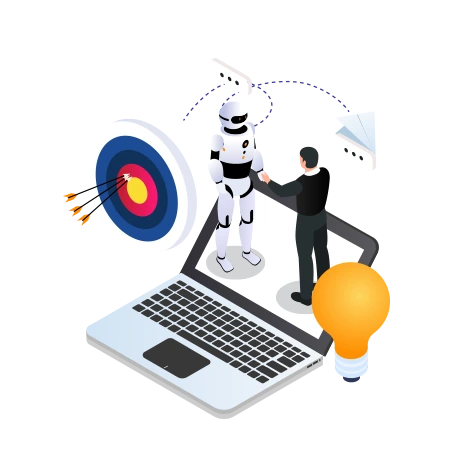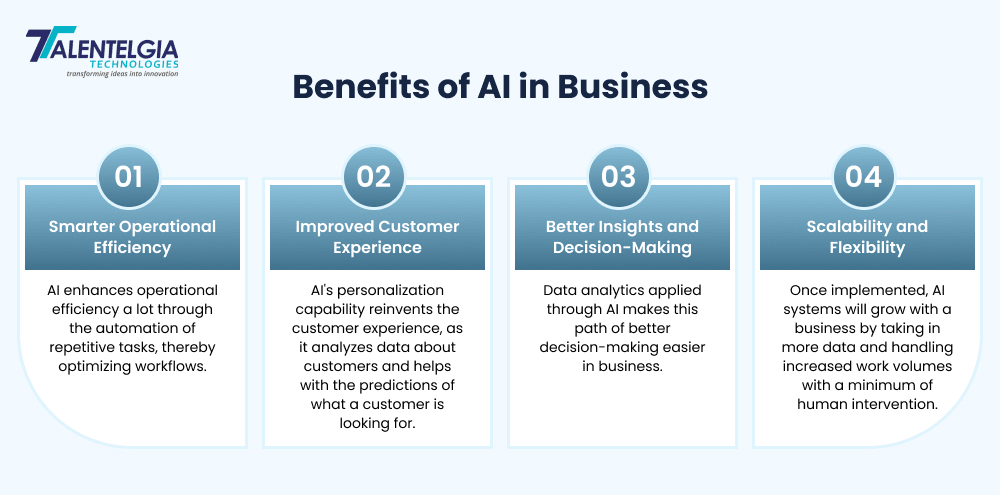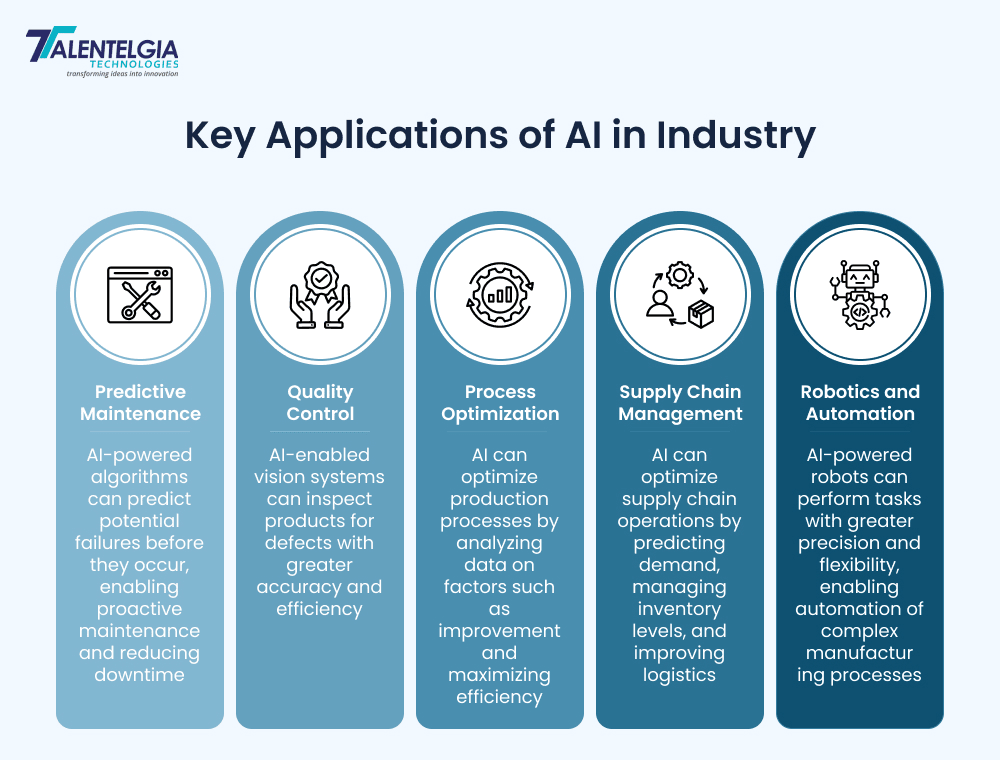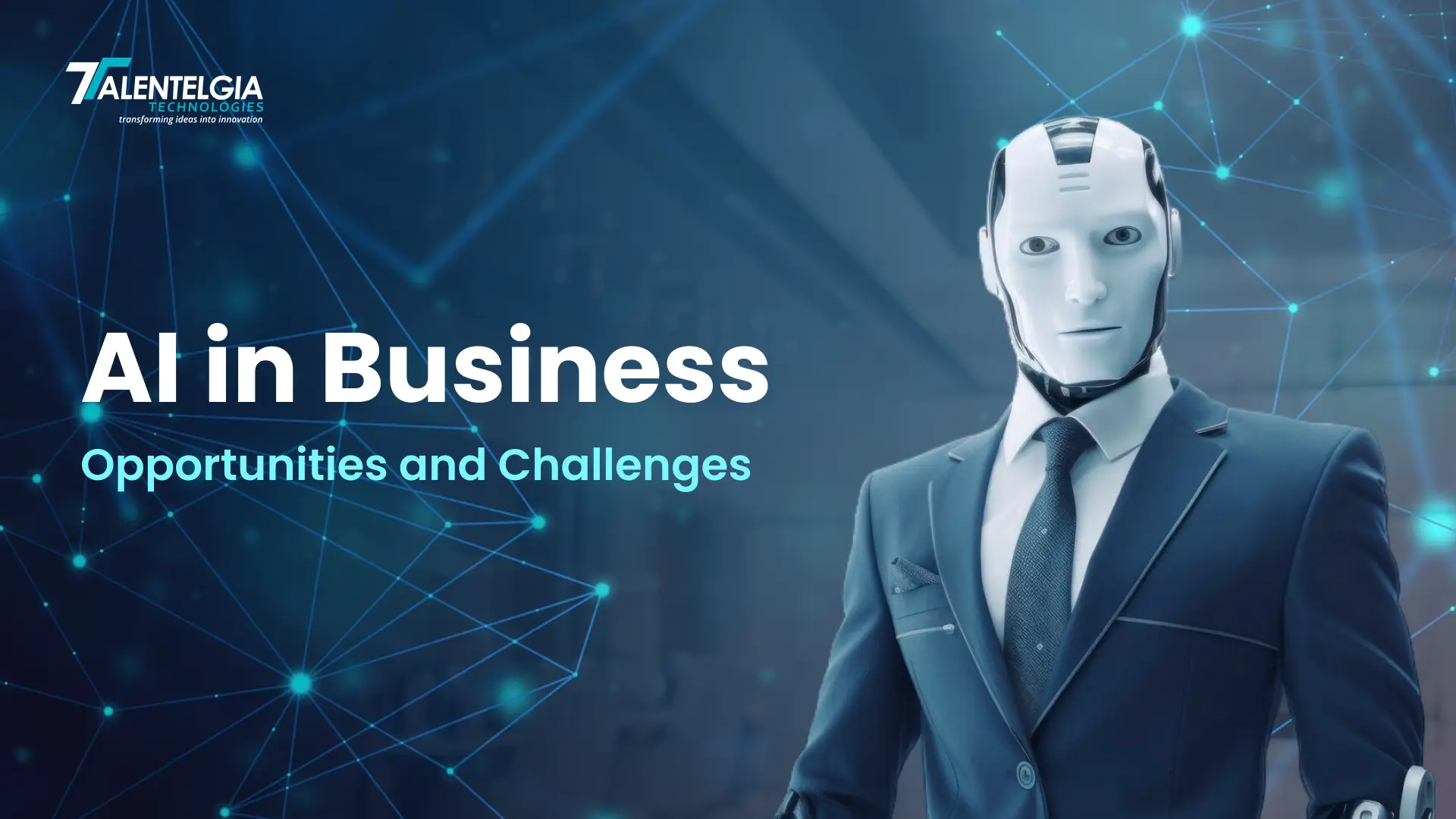Artificial intelligence is transforming businesses. How businesses operate and deliver services is now different from what it used to be. Every sector from startups to multinational companies are now adopting AI in business to streamline processes, make better decisions, and ensure a good customer experience.
Technology is helping AI become more powerful, leading to new ideas and better efficiency in many industries. However, there are still some challenges. In this blog, we look at major opportunities AI offers and some challenges they face in implementing those effectively.
Opportunities of AI in Businesses
In today’s economy, AI is driving growth and innovation. For many businesses, AI opens up opportunities by enabling smart decisions to be made by analyzing patterns in data. From day-to-day operations to delivering valuable insights, AI helps businesses succeed in every aspect.
AI offers numerous opportunities for businesses. Below we will discuss how businesses can leverage AI to their competitive advantage.
Automation and Efficiency
AI helps in business automation like in complex and error-prone processes. AI-driven automation takes over repetitive tasks like data entry and customer queries. This allows employees to work on more important work.
Growth with AI We are a team of 150+ AI experts delivering
innovative solutions in 20+ countries.
Contact us to transform your business.

This means a reduction not only in operational costs but also an increase in terms of accuracy and consistency.
Besides, AI-based automation continues beyond simple tasks. Advanced AI systems can handle very complex processes that include financial forecasting and supply chain management.
Better Decision-Making
With better access to information, decision-making has become crucial in today’s data-driven world. AI enables rapid analysis of huge data and fetches actionable insight from it; a job that, if done by human beings, would take days or sometimes even weeks. AI uses predictive analytics and machine learning to forecast market trends, customer behavior, and operational risks.
Personalization and Customer Experience
AI makes connecting with customers easier for businesses. AI-driven personalization helps them to show the services and products that match their preferences. It also helps businesses generate more revenue through personalized product offerings on e-commerce and targeted marketing campaigns.
For example, streaming services like Netflix use AI algorithms to make recommendations to users based on the tendency of their use. This type of personalization not only enhances customer satisfaction but also creates brand loyalty.
Improved Productivity
Employees can automate routine work using various AI tools and access data, thereby creating better teamwork. The upshot will be quicker decision-making, easy communication, and an agile work environment.
AI-powered virtual assistants, for instance, can schedule meetings, manage emails, and carry out data analysis. This then frees your employees to work on more high-value-added work. As AI continues to improve, there will be even more dramatic improvements both in the productivity of businesses and in the smooth running of businesses.
New Business Models and Innovations
It is creating not only new business models but also improving the existing ones. Startups and established companies use AI to develop a bevy of innovative products and services that were not thought of even a few years ago. AI-driven businesses are growing in very important verticals like healthcare and finance.
For example, AI enabled the creation of predictive diagnostic tools in healthcare and robo-advisors in finance that provide automatic financial advice. Companies are also experimenting with ways to make a product catalog using AI, combining product data and design automation to deliver faster results.That is how powerful innovations change the face of industries and unlock new streams of revenue for those organizations capable of embracing AI.
Benefits of AI In Business
Using AI in business operations brings many benefits that boost performance through better integration. This is because AI does much more than just automate; it provides solutions for a wide range of challenging situations and serves as an important driver of innovation. Here are some of its benefits:

The Challenges of AI in Business
While AI has potential, there are several challenges with the adoption process. As with any other new technology, some issues and concerns of risks do arise.
We will consider all those significant challenges that businesses have to overcome to be able to work with AI. We are going to touch on aspects like data privacy and security, ethical implications, technical limitations, and job displacements.
An understanding of these challenges allows businesses to create proactive strategies that aim at addressing them and thus have their adaptation of the AI technologies be a success.
A strategic approach, therefore, will help companies mitigate key concerns and sail through the complexities of implementation to unlock the benefits of AI.
This section shall look at these challenges of AI in business:
Data Bias
There is an ethical question about AI making independent decisions. Most of the algorithms that make up AI have elements of bias since most of the datasets that they reflect are biased. Without control, the bias perpetuates AI into some very unfair practices, such as discrimination in hiring and lending.
How to make the AI systems transparent, fair, and accountable also causes a challenge for businesses in terms of reputational damage and regulatory scrutiny.
Data Privacy and Security
Large amounts of data on which AI systems rely include sensitive and personal information regarding people. While the business world is using AI technology, security and privacy concerns for their customers’ data should be of utmost concern to avoid breaches.
Along with AI, cybersecurity risks also become bigger because many such systems tend to be the prime targets of hackers. Thus, balancing data security and keeping AI effective has been more of an art or a balance a company would have to learn.
Cost and Implementation Barriers
Though AI has plenty of benefits, its adoption is highly expensive. The high cost of initial investment in technology, infrastructure, and expertise makes it beyond the reach of many companies, especially small and medium-scale enterprises.
Integration involving AI in the already existing systems involves a complicated process; hence, this is considered one of the barriers to the spread of AI. To complement these challenges, the companies should have a strategic roadmap, investment in AI, and collaboration with AI providers.
Workforce Displacement
AI automates tasks, hence many people are threatened to lose their jobs because of AI. The more extensive the functions performed by the AI systems, the more likely certain roles will be a thing of the past. Although AI offers growth opportunities, businesses need to adapt their skills to avoid large-scale job losses.
Organizations are supposed to invest in training programs that would update the capabilities of employees to work with AI technologies.
Regulatory and Legal Challenges
Artificial Intelligence is considered, more or less, a relatively recent technology, and, most legal frameworks find it rather challenging to keep pace with the same. Businesses need to address regulatory changes in a way that applications of Artificial Intelligence will always remain under the ambit of local and international statutes. This can lead to fines, litigations, and reputation loss if not taken seriously.
AI-Driven Solutions. Ready to unlock the potential of AI?
Our team of 150+ AI experts help you
leverage AI to drive business growth.

Addressing AI Adoption Challenges
Every company needs to adopt a somewhat strategic approach to implement AI and gain an advantage over the competition. This includes comprehension of needs, finding the right use case, and building capability.
This section reflects some steps a business can consider working toward using AI effectively. By doing this, businesses will be able to draw maximum value from AI to drive innovation.
Addressing Ethics
Addressing ethical issues can be made sure only by implementing the framework of AI governance concerning nondiscrimination and fairness. For that, businesses need to continuously conduct audits of AI systems, handle data, and involve diverse teams in AI development. An ethical guideline, therefore, means taking necessary steps to reduce bias and evolve an AI system that would benefit one and all.
Enhancing Data Privacy and Security
Businesses should secure sensitive data through cybersecurity services. This may be done through the encryption of data, updating security protocols from time to time, and best practices during its storage. In this way, the business ensures AI systems are secure and compliance with data privacy regulations has been adhered to.
Managing Implementation Costs
One possible way of offsetting the high cost of AI is the concept of gradual implementation. Organizations don’t have to implement the technology in large projects but, instead, can initiate small projects within multiple functions. Second, collaboration with AI solution providers will allow the sharing of AI development costs, thereby allowing organizations to leverage the best available technologies without having to over-stretch their budgets.
Reskilling and Workforce Adaptation
The employees should be rightly trained so that they can become reskilled and work with AI technologies. The organizations have to make popular AI-related learning programs in the firm to develop in-house expertise with the help of online courses.
Future of AI Trends for Businesses

The advancements happening in AI are no longer just improving the present practices but are also laying the ground for innovations. AI’s influence continues to grow, transforming business processes and creating new opportunities.
Let us look into the key future trends in AI that will remake business in the future. These trends show just how, in the coming years, AI will continue to facilitate progress, eradicate emerging challenges, and present new opportunities to businesses all around the globe.
AI-Driven Automation of Business Processes
The scope of AI-driven automation will increase, covering most of the business processes. Advanced AI algorithms will span everything from routine tasks to higher-order tasks involving decision-making and strategy formulation. This, in turn, will lead to increased efficiency, reduction of operational costs, and quick response to changes in the market. AI automates supply chain management, financial forecasting, and even creative tasks such as content creation and designing products.
Integration of AI with the Internet of Things
AI integration with IoT can lead to the next wave of innovation. AI enhances IoT systems’ intelligence through capabilities for real-time data analysis and predicts actions toward further intelligence for smarter decision-making and automation.
Examples include IoT devices powered by AI, to be applied in smart cities to optimize the flow of traffic, manage energy consumption, and enhance public safety. This will provide the industries with the predictive maintenance needed, monitor equipment performance, and enhance efficiency through the incorporation of AI in IoT solutions. The resultant synergy is towards a more intelligent and connected environment of many sectors.
Evolution of AI in Healthcare
AI has bright prospects in health, with a host of game-changing alterations. The AI in personalized medicine would have genetic information included for decision-making regarding customized treatments and therapies.
AI diagnosis tools will facilitate the ability to make correct and quicker conclusions.This can be done with timely disease identification for better outcomes. AI will improve drug discovery, administrative work, and remote patient monitoring. To reconstitute health service delivery and management.
AI in Augmented Reality (AR) and Virtual Reality (VR)
AI is going to make AR and VR much more interactive and immersive, with enormous possibilities. In the context of business, that would extend to higher levels of training simulation, virtual product demonstrations, and customer experience. AI-powered augmented and virtual reality applications introduce real-time object recognition, personalized content, and adaptive learning capabilities that are likely to change just about everything from how companies do business with customers to the way they train employees.
AI-Improved Cyber Security
With evolving cyber threats, the role of AI in cybersecurity will be very important. AI-powered security solutions hold a much better promise in threat detection, real-time threat monitoring, and real-time response against any type of cyber attack. Machine learning algorithms study patterns for identifying deviations that enable one to proactively act against emerging threats. AI-enhanced cybersecurity systems strengthen the resilience of systems and protect sensitive data against increasingly sophisticated attacks.
AI-Powered Creativity and Innovation
AI will continue to extend the creative job in design, music, and content creation. It includes ideation, optimization of creative processes, and development of innovative products and services in businesses. Companies can apply AI during brainstorming, prototype development, and idea distillation, as it helps them continuously generate leads in competitive markets.
Conclusion
AI brings opportunities for innovation, efficiency, and scalability, thus revolutionizing businesses in every industry. But its benefits also bring challenges in the form of ethical concerns, cost barriers, and disruption to the workforce. The full realization of these opportunities among businesses calls for strategies that mitigate these challenges and ensure AI adoption responsibly, securely, and to the benefit of all.
We hope that the blog above helps businesses make the right choice when it comes to AI implementation for their business.


 Healthcare App Development Services
Healthcare App Development Services
 Real Estate Web Development Services
Real Estate Web Development Services
 E-Commerce App Development Services
E-Commerce App Development Services E-Commerce Web Development Services
E-Commerce Web Development Services Blockchain E-commerce Development Company
Blockchain E-commerce Development Company
 Fintech App Development Services
Fintech App Development Services Fintech Web Development
Fintech Web Development Blockchain Fintech Development Company
Blockchain Fintech Development Company
 E-Learning App Development Services
E-Learning App Development Services
 Restaurant App Development Company
Restaurant App Development Company
 Mobile Game Development Company
Mobile Game Development Company
 Travel App Development Company
Travel App Development Company
 Automotive Web Design
Automotive Web Design
 AI Traffic Management System
AI Traffic Management System
 AI Inventory Management Software
AI Inventory Management Software
 AI Software Development
AI Software Development  AI Development Company
AI Development Company  AI App Development Services
AI App Development Services  ChatGPT integration services
ChatGPT integration services  AI Integration Services
AI Integration Services  Generative AI Development Services
Generative AI Development Services  Natural Language Processing Company
Natural Language Processing Company Machine Learning Development
Machine Learning Development  Machine learning consulting services
Machine learning consulting services  Blockchain Development
Blockchain Development  Blockchain Software Development
Blockchain Software Development  Smart Contract Development Company
Smart Contract Development Company  NFT Marketplace Development Services
NFT Marketplace Development Services  Asset Tokenization Company
Asset Tokenization Company DeFi Wallet Development Company
DeFi Wallet Development Company Mobile App Development
Mobile App Development  IOS App Development
IOS App Development  Android App Development
Android App Development  Cross-Platform App Development
Cross-Platform App Development  Augmented Reality (AR) App Development
Augmented Reality (AR) App Development  Virtual Reality (VR) App Development
Virtual Reality (VR) App Development  Web App Development
Web App Development  SaaS App Development
SaaS App Development Flutter
Flutter  React Native
React Native  Swift (IOS)
Swift (IOS)  Kotlin (Android)
Kotlin (Android)  Mean Stack Development
Mean Stack Development  AngularJS Development
AngularJS Development  MongoDB Development
MongoDB Development  Nodejs Development
Nodejs Development  Database Development
Database Development Ruby on Rails Development
Ruby on Rails Development Expressjs Development
Expressjs Development  Full Stack Development
Full Stack Development  Web Development Services
Web Development Services  Laravel Development
Laravel Development  LAMP Development
LAMP Development  Custom PHP Development
Custom PHP Development  .Net Development
.Net Development  User Experience Design Services
User Experience Design Services  User Interface Design Services
User Interface Design Services  Automated Testing
Automated Testing  Manual Testing
Manual Testing  Digital Marketing Services
Digital Marketing Services 
 Ride-Sharing And Taxi Services
Ride-Sharing And Taxi Services Food Delivery Services
Food Delivery Services Grocery Delivery Services
Grocery Delivery Services Transportation And Logistics
Transportation And Logistics Car Wash App
Car Wash App Home Services App
Home Services App ERP Development Services
ERP Development Services CMS Development Services
CMS Development Services LMS Development
LMS Development CRM Development
CRM Development DevOps Development Services
DevOps Development Services AI Business Solutions
AI Business Solutions AI Cloud Solutions
AI Cloud Solutions AI Chatbot Development
AI Chatbot Development API Development
API Development Blockchain Product Development
Blockchain Product Development Cryptocurrency Wallet Development
Cryptocurrency Wallet Development About Talentelgia
About Talentelgia  Our Team
Our Team  Our Culture
Our Culture 
 Healthcare App Development Services
Healthcare App Development Services Real Estate Web Development Services
Real Estate Web Development Services E-Commerce App Development Services
E-Commerce App Development Services E-Commerce Web Development Services
E-Commerce Web Development Services Blockchain E-commerce
Development Company
Blockchain E-commerce
Development Company Fintech App Development Services
Fintech App Development Services Finance Web Development
Finance Web Development Blockchain Fintech
Development Company
Blockchain Fintech
Development Company E-Learning App Development Services
E-Learning App Development Services Restaurant App Development Company
Restaurant App Development Company Mobile Game Development Company
Mobile Game Development Company Travel App Development Company
Travel App Development Company Automotive Web Design
Automotive Web Design AI Traffic Management System
AI Traffic Management System AI Inventory Management Software
AI Inventory Management Software AI Software Development
AI Software Development AI Development Company
AI Development Company ChatGPT integration services
ChatGPT integration services AI Integration Services
AI Integration Services Machine Learning Development
Machine Learning Development Machine learning consulting services
Machine learning consulting services Blockchain Development
Blockchain Development Blockchain Software Development
Blockchain Software Development Smart contract development company
Smart contract development company NFT marketplace development services
NFT marketplace development services IOS App Development
IOS App Development Android App Development
Android App Development Cross-Platform App Development
Cross-Platform App Development Augmented Reality (AR) App
Development
Augmented Reality (AR) App
Development Virtual Reality (VR) App Development
Virtual Reality (VR) App Development Web App Development
Web App Development Flutter
Flutter React
Native
React
Native Swift
(IOS)
Swift
(IOS) Kotlin (Android)
Kotlin (Android) MEAN Stack Development
MEAN Stack Development AngularJS Development
AngularJS Development MongoDB Development
MongoDB Development Nodejs Development
Nodejs Development Database development services
Database development services Ruby on Rails Development services
Ruby on Rails Development services Expressjs Development
Expressjs Development Full Stack Development
Full Stack Development Web Development Services
Web Development Services Laravel Development
Laravel Development LAMP
Development
LAMP
Development Custom PHP Development
Custom PHP Development User Experience Design Services
User Experience Design Services User Interface Design Services
User Interface Design Services Automated Testing
Automated Testing Manual
Testing
Manual
Testing About Talentelgia
About Talentelgia Our Team
Our Team Our Culture
Our Culture


















 Write us on:
Write us on:  Business queries:
Business queries:  HR:
HR: 





